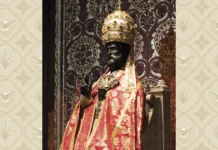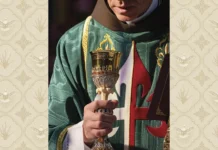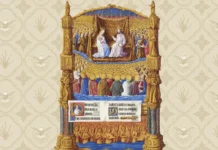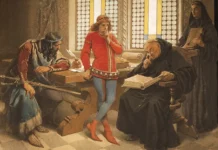During the Passion, the Lord carried the wood of the Cross, which became for Him a sceptre of power. With invincible steadfastness, He displayed upon His shoulders, for all the people to adore, the standard of salvation.
Having discoursed in our last sermon on the events which preceded the Lord’s arrest, it now remains, with the help of divine grace, to discuss, as we promised, the details of the Passion itself.
The sons of darkness assail the true Light
The Lord had made it clear by the words of His sacred prayer (cf. Jn 17) that both the human and divine natures were most truly and fully present in Him. From one proceeded the reluctance to suffer, from the other the determination to suffer.
However, having banished the fears stemming from weakness and confirming the greatness of His strength, He returned to the resolution of the eternal designs, and in the condition of a sinless Slave, He resisted the fury of the devil who attacked Him by the hands of the Jews. In this way, the cause of all would be undertaken by the sole One who shared the nature of all, without sin.
The sons of darkness, therefore, assailed the true Light. And though they used torches and lanterns, they could not escape the night of their infidelity, because they did not recognize the Author of the light. They arrest Him, who puts up no resistance; they lead Him away, and He is willing to be led. If He had willed to resist, their wicked hands could have done Him no harm, yet thereby the world’s Redemption would have been delayed. Without suffering, He who came to die for all men’s salvation would have saved none.
Allowing the people’s fury, incited by the priests, to afflict Him as much as it dared do, He is brought to Annas, father-in-law of Caiaphas, and then sent back to Caiaphas, by order of Annas. After the calumnious accusations made against Him and the false testimony of bribed witnesses, a delegation of the high priests brings Him to the tribunal of Pilate. […]
The Lord was handed over to the wrath of His enemies
Bowing to the madness of the implacable mob, Pilate allowed Jesus to be tormented with outrageous barbarities and unspeakable insults. He then presented Him to the crowd scourged, crowned with thorns, and clothed in a robe of derision.
Pilate doubtless thought to appease His enemies, so that when they had satisfied their envious hatred, they might cease to further persecute the One Whom they beheld already so abused. However, their wrath was only further kindled, and they cried out for the liberation of Barabbas and the crucifixion of Jesus. “His blood be on us and on our children” (Mt 27:25), the crowd roared in unison. Thus, those wicked people obtained, to their own condemnation, that which they persistently demanded. […]
And so the Lord was handed over to the wrath of His enemies and they, in order to mock His royal dignity, obliged Him to carry the Cross. Thus was fulfilled what Isaiah had foretold: “For to us a Child is born, to us a Son is given; and the government will be upon His shoulders” (Is 9:6).
Therefore, the Lord carried the wood of the Cross, which became for Him a sceptre of power. For the wicked, this was an object of derision, but to the eyes of the faithful a great mystery was set forth, for the most glorious vanquisher of the devil and the omnipotent destroyer of the opposing powers, resplendent with beauty, bore the trophy of His triumph.
With invincible steadfastness, He displayed upon His shoulders, for all the people to adore, the standard of salvation. By His example, He strengthened all His followers, as if saying to them: “He who does not take his cross and follow Me is not worthy of Me” (Mt 10:38). […]

Fount of all blessings and source of all graces
O wondrous power of the Cross! O ineffable glory of the Passion! In it is contained the Lord’s tribunal, the world’s judgment, and the power of the Crucified.
For Thou didst draw all things unto Thyself, Lord, and when Thou didst stretch out Thy arms during an entire day to an unbelieving people that rebelled against Thee (cf. Is 65:2; Rom 10:21), the entire world was touched by the divine light to proclaim Thy majesty.
Thou didst draw all things unto Thyself, Lord, when all the elements combined to pronounce judgment in execration of the crime committed against Thee: the heavenly lights were darkened, and the day turned into night, and the earth was shaken by extraordinary tremors, and all creation repudiated those wicked men.
Thou didst draw all things unto Thyself, Lord, for when the veil of the Temple was rent, the Holy of Holies separated itself from those unworthy high priests, so that the image give way to the Truth; the prophecy to manifestation, and the Law, to the Gospel.
Thou didst draw all things unto Thyself, Lord, so that what before was done in the one Temple of Judea, under dark symbols, was now to be celebrated in all the nations of the world, by means of a perfect and manifest sacrament.
In fact, there is now a more illustrious rank of Levites; there are elders of greater dignity and a more sacred anointing of priests, because Thy Cross is the fount of all blessings and the source of all graces. Through it the faithful receive strength for weakness, glory for shame, and life for death.
Now the variety of carnal sacrifices has ceased, and the one offering of Thy Body and Blood makes all the other victims unnecessary, for Thou art the true “Lamb of God, who takes away the sin of the world” (Jn 1:29). Thus, in Thee is accomplished all mysteries, for just as there is but one sacrifice, all the peoples form but one kingdom.
“Those who live might live no longer for themselves”
Therefore, let us confess that which the blessed teacher of the nations, the Apostle Paul, confessed with a glorious voice: “The saying is sure and worthy of full acceptance, that Christ Jesus came into the world to save sinners” (1 Tim 1:15).
Thus, God’s mercy towards us is all the more wonderful since Christ died not for the righteous nor for the holy, but for the unrighteous and wicked. And though the divine nature could not receive the sting of death, He was born as one of us so that He might assume that which He would offer for us. For long ago He threatened our death with the power of His death, saying by the lips of Hosea: “O death, I will be thy death; O hell, I will be thy destruction” (13:14 Vulgate).
For by dying He subjected Himself to the laws of hell, but by rising again, He abolished them. He destroyed the perpetuity of death, making it temporal instead of eternal. “For as in Adam all die, so also in Christ shall all be made alive” (1 Cor 15:22).
And so, dearly-beloved, let that come to pass of which the Apostle Paul spoke: “Those who live might live no longer for themselves but for Him who for their sake died and was raised” (2 Cor 5:15). Now, as the old things have passed away and all things have become new, let none remain in his old carnal life, but let us all be renewed by daily progress and growth in piety. For however much a man be justified, yet so long as he remains in this life, he can always be more perfect. And he that is not advancing is regressing, and he that is gaining nothing is losing something.
Thus, let us take care to march in step with faith, by works of mercy, in the love of righteousness, so that by celebrating spiritually the day of our Redemption, “not with the old leaven, the leaven of malice and evil, but with the unleavened bread of sincerity and truth” (1 Cor 5:8), we may deserve to be partakers of Christ’s Resurrection, who with the Father and the Holy Spirit lives and reigns for ever and ever. Amen. ◊
St. Leo the Great. Excerpts from Sermon LIX,
on the Passion of the Lord: PL 54, 337-342







